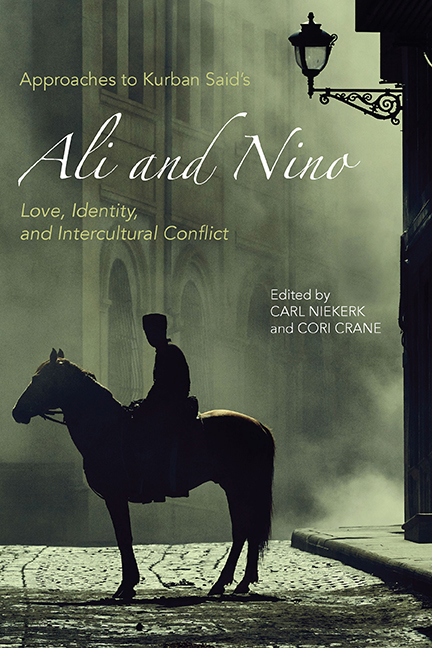Book contents
- Frontmatter
- Contents
- Acknowledgments
- Notes on Editions of and References to Ali and Nino
- Introduction: Ali and Nino as World Literature
- 1 Ali and Nino: The Novel as/of Cultural Translation
- 2 Crossing Borders, Crossing Disciplines: Ali and Nino in the Twenty-First Century
- 3 Glowing Rubies and Persian Daggers: The Role of Persian Poetry in Ali and Nino
- 4 Gendered Stereotypes and Cross-Cultural Moral Values through the Eyes of Kurban Said
- 5 Orientalist Itineraries: Cultural Hegemony, Gender, Race, and Religion in Ali and Nino
- 6 Gendered Conflicts in Muslim and Christian Cultures: Honor (and Shame) in Ali and Nino
- 7 Love and Politics: Retelling History in Ali and Nino and Artush and Zaur
- 8 “Herr Professor, Please: We'd Rather Stay in Asia”: Ali Khan Shirvanshir and the Spaces of Baku
- 9 The Female Body and the Seduction of Modernity in Ali and Nino
- 10 Seeing the Unseen: Symbolic Writing in Ali and Nino
- 11 Ali and Nino and Jewish Questions
- 12 Between Orientalism and Occidentalism: Culture, Identity, and the “Clash of Civilizations” in Ali and Nino
- Works Cited
- Notes on the Contributors
- Index
11 - Ali and Nino and Jewish Questions
Published online by Cambridge University Press: 30 August 2017
- Frontmatter
- Contents
- Acknowledgments
- Notes on Editions of and References to Ali and Nino
- Introduction: Ali and Nino as World Literature
- 1 Ali and Nino: The Novel as/of Cultural Translation
- 2 Crossing Borders, Crossing Disciplines: Ali and Nino in the Twenty-First Century
- 3 Glowing Rubies and Persian Daggers: The Role of Persian Poetry in Ali and Nino
- 4 Gendered Stereotypes and Cross-Cultural Moral Values through the Eyes of Kurban Said
- 5 Orientalist Itineraries: Cultural Hegemony, Gender, Race, and Religion in Ali and Nino
- 6 Gendered Conflicts in Muslim and Christian Cultures: Honor (and Shame) in Ali and Nino
- 7 Love and Politics: Retelling History in Ali and Nino and Artush and Zaur
- 8 “Herr Professor, Please: We'd Rather Stay in Asia”: Ali Khan Shirvanshir and the Spaces of Baku
- 9 The Female Body and the Seduction of Modernity in Ali and Nino
- 10 Seeing the Unseen: Symbolic Writing in Ali and Nino
- 11 Ali and Nino and Jewish Questions
- 12 Between Orientalism and Occidentalism: Culture, Identity, and the “Clash of Civilizations” in Ali and Nino
- Works Cited
- Notes on the Contributors
- Index
Summary
Isn't it enough that we Jews are viewed through English spectacles and are not allotted our place accordingly? Must we look at our own Arabic environment through their glasses, too?
—Franz Baermann SteinerIN HIS WORK ON THE CONNECTIONS between conceptualizations of India's Muslim minority and Europe's so-called Jewish question, Aamir Mufti argues that “it is in the eruption of such crises around the meaning of Jewishness [in modern Europe] that we get the earliest elaborations of minority cultural practices as a critique of dominant culture and its majoritarian affiliations.” Susannah Heschel and Christian Wiese, among others, have also suggested that modern Jewish thought can be fruitfully read as postcolonial, locating the Jew as Europe's “internal other,” in a position analogous to that of colonized peoples vis-à-vis European hegemony. In her work on Abraham Geiger, Heschel argues that the scholarly movement in which Geiger took part, known as Wissenschaft des Judentums, “is one of the earliest examples of postcolonialist writing.” According to Heschel, the texts produced by the scholars of Wissenschaft des Judentums “ were the first to call into question accepted ‘truths’ about the history of the West.” It is in light of such conceptual links between modern Jewish thought and history and (post)colonial theory and modernities that this essay approaches Ali and Nino as a novel that reflects what Ivan Davidson Kalmar has called “the long history of the joint construction of Jew and Muslim.” Jews are rarely mentioned in the novel and they are certainly not explicitly linked to Muslims in the text. Rather, it is the novel's treatment of Islam and Islamic and “Oriental” responses to the West that bares comparison to Western discourses surrounding Judaism. This essay explores the links between Ali and Nino's literary representation of modernization in the Caucasus and questions related to Jewish identity in modern Europe.
This essay endeavors to read Ali and Nino in relationship to the “Jewish question,” but in a more expansive manner than Tom Reiss's treatment of the same subject in The Orientalist. The fact that the author of Azerbaijan's “national epic” was in fact born a Jew continues to be controversial.
- Type
- Chapter
- Information
- Approaches to Kurban Said's Ali and NinoLove, Identity, and Intercultural Conflict, pp. 210 - 226Publisher: Boydell & BrewerPrint publication year: 2017



